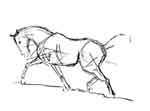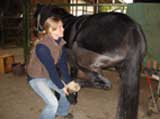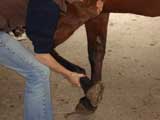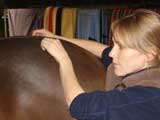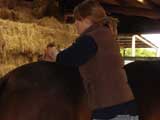Case History
A thorough case history is taken of the life of the animal, previous/current problems,
any change in behaviour and exercise patterns to build a full picture of all major aspects of the animal.
This is also to ensure that the animal is appropriate for treatment.
Lame horses will only be treated with direct veterinary referral
after discussion with your vet.
Assessment of Conformation and Gait
The next step is a static assessment & gait evaluation of the whole animal to allow problem areas to be identified.
The static assessment considers conformation, scars, lumps, bumps, range of motion of the joints, muscle development,
asymmetry or weakness. Observing the gait at a walk and trot up in hand allows analysis of movement patterns, compensations and soundness. For horses, they may also be observed on the lunge and sometimes ridden.
Physical Assessment
Palpating for any skeletal misalignments and muscle spasms assessing the whole body - starting at the head,
working down the spine to the pelvis and finishing with the feet.
Treatment
A combination of manipulation, massage, stress points and mobilisation techniques
will be used appropriately, using only the hands.
Aftercare advice
The treatment is a process so for the next 24-72 hours the body will
continue to change and settle in response to any adjustments. A
specific aftercare programme will be given for the following few
days in order to give the best opportunity for effectiveness to
allow any adjustments to settle - it is important that the aftercare
advice is followed. It helps to think of the technique as a
‘catalyst to change’ where the body’s inherent ability to be well
takes over after the treatment.
Rehabilitation, stretching and flexibility exercises will be advised where appropriate to allow the owner to continue to rehabilitate the animal. For horses, these may be ridden exercises or carried out from the floor.
Further sessions
The number of treatments necessary varies. This depends on the nature and onset of the problem.
Where appropriate Harriet will refer back to your vet for further investigation or diagnosis or for another type of therapy.
|
